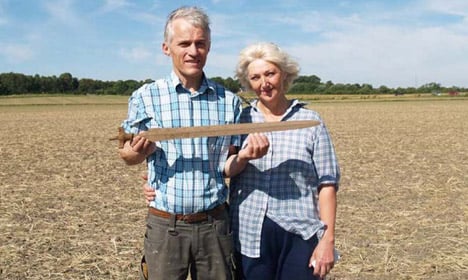In fact, there have been so many discoveries that the National Museum of Denmark has said it simply cannot process them in a timely manner anymore.
HISTORY
3,000-year-old sword found in Denmark is ‘still sharp’
A 82cm Bronze Age sword was recently discovered by amateur archaeologists near the Danish town of Svebølle, Museum Vestsjælland announced on Wednesday.
Published: 31 August 2016 14:18 CEST

Ernst Christiansen and Lis Therkelsen found the 3,000-year-old sword. Photo: Museum Vestsjælland
Local residents Ernst Christiansen and Lis Therkelsen had taken their metal detector along when they were out for an evening stroll in a field in western Zealand when the machine alerted them to the presence of something under the ground.
When they dug down some 30cm, they found what appeared to be the end of a sword. Recognizing the potential importance of the discovery, the two amateur archaeologists reburied the object and contacted Museum Vestsjælland the next morning.
Museum inspector Arne Hedegaard Andersen joined the pair the next day and together they uncovered what the museum called “an incredibly well-preserved sword”.
“The sword is so well-preserved that you can clearly see the fine details. And it is even sharp,” the museum wrote in a press release.
The museum believes that the sword dates to Phase IV of the Nordic Bronze Age, or somewhere between 1100 and 900 BC.
The sword will be displayed at Kalundborg Museum on September 7th before being processed and catalogued.
Denmark is currently in the midst of a remarkable period when it comes to discovering treasures from the past.
Some of the more notable recent discoveries have included the largest-ever find of Viking gold, an 1,100-year-old crucifix that may change the understanding of when Christianity came to Denmark, a hoard of 700 year-old coins, some 2,000 gold spirals used by sun-worshiping priest-kings during the Bronze Age, and a ‘lost’ rune stone that turned up in a farmer’s backyard, to name just a few.
Url copied to clipboard!


 Please whitelist us to continue reading.
Please whitelist us to continue reading.
Member comments